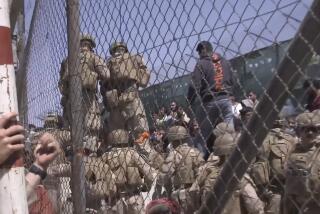Relatives of 2010 Afghan air crash victims lobby for redress
- Share via
Reporting from Kabul, Afghanistan — The moment Aminullah Arbabi heard that Pamir Airways Flight 112 to Kabul had disappeared in the mountains north of the capital, he ran to his car.
His younger brother was on the plane, returning home from work in the northern city of Kunduz. Arbabi had only one thought: Find him.
He raced out of Kabul that May afternoon and arrived after dark in the snowy Salang Pass about 60 miles north of the capital, where the plane had reportedly crashed.
The 29-year-old construction engineer waited until morning, then set out on foot. Still wearing only a light cotton suit and sneakers, his head and hands bare against the blistering cold, he searched the treeless snowscape, peering into the haze, convinced that his brother was dead but determined to find his body.
Arbabi was the oldest of six, yet it was his tough younger brother — 25-year-old Hamidullah Arbabi, a driver for a security company that protected U.S. reconstruction teams — who was the provider. Hamidullah earned $600 a month, compared with Aminullah’s $200, enough to support them all.
“In Afghanistan, we live in a collective society,” Aminullah Arbabi said. “He was everything for this family.”
Arbabi searched for three days, sleeping in his car, until news broke that Afghan police and North Atlantic Treaty Organization forces had found the plane’s wreckage about 50 miles south. He returned to Kabul to await the return of his brother’s body.
Weeks later, investigators confirmed through DNA that his brother was among the 44 passengers and crew members killed, all those aboard. His family received a letter from U.S. Ambassador to Afghanistan Karl Eikenberry praising Hamidullah Arbabi’s “exceptional efforts to secure and further our agricultural development activities.”
A Pamir Airways representative called to offer condolences and promised the family a death benefit of $140,000.
“Our plane is insured,” Arbabi said the Pamir staffer told him, “so don’t worry, we will pay you.”
A year later, Arbabi and 28 other Afghan families of Flight 112 victims have received $11,000 each from Pamir Airways, which by law is required to compensate the families directly.
The families have continued to lobby Pamir officials, but it appears that the troubled airline, whose license has been suspended over safety violations, may never pay.
Among those killed in the May 17, 2010, crash were 15 foreign nationals, three each from Britain, Pakistan, Tajikistan, Turkey and the Philippines. Families of the British victims are also still pursuing death benefits, according to a British Embassy spokesman. Staff members at the other embassies in Kabul could not confirm whether their citizens’ families had received any death benefits.
Pamir spokesmen did not return phone calls and could not be reached at their Kabul office, which has been closed.
Pamir, named after a famous mountain range, was founded 16 years ago and grew to become Afghanistan’s best-known airline. Its billboards can be seen around Kabul. Its motto: “Fly with confidence.”
Afghan authorities temporarily suspended Pamir’s license in March after the Flight 112 crash investigation revealed problems with the plane’s safety equipment and registration.
The black box and flight recorder were not working at the time of the crash, according to Daud Ali Najafi, the acting minister of transport and civil aviation. Records showed that after Pamir purchased the 37-year-old Antonov An-24 in Bulgaria last year, its Afghan registration was apparently forged, allowing the company to avoid safety inspections.
The Afghan attorney general’s office is investigating, Najafi said.
“When a company submits forged documents regarding the safety of the plane, that company is no longer trusted,” Najafi said.
Pamir executives had until earlier this month to address the registration and safety problems and pay the families the promised death benefit, Najafi said, or risk losing their license permanently. He said he had been in touch with the airline’s insurer, Insurance Corp. of Afghanistan, but that it was the airline that must pay the families.
Arbabi blames Pamir officials for delaying the payments, and he also points a finger at the Afghan government, which he said should hold the company accountable.
Najafi said he has asked officials at the Finance Ministry and central bank to seize the death benefits from Pamir’s accounts, which have been frozen.
Pamir was financed by scandal-plagued Kabul Bank, which was placed in receivership and had some assets put up for sale this month after an investigation by Afghan authorities showed that the bank had made about $909 million in bad loans to shareholders, including interest, and had only recovered 5% in payments.
The Afghan families of crash victims have selected Karima Sadiqi, a member of the Kunduz provincial council who lost two daughters in the accident, to negotiate on their behalf. She was supposed to have a meeting with President Hamid Karzai’s Cabinet last week, but it was postponed.
“We expect the government to pay families from Pamir’s assets,” Sadiqi said.
Meanwhile, Arbabi has buried what was left of his brother in a small cemetery just up the hill from the family’s Soviet-era apartment tower overlooking Kabul International Airport.
Sometimes he walks up the rocky hill, past boulders and shepherds and boys playing soccer. He sits by the unmarked gray stone and stares out at the runway where his brother was supposed to have landed.
molly.hennessy-fiske@latimes.com
Special correspondent Aimal Yaqubi contributed to this report.
More to Read
Sign up for Essential California
The most important California stories and recommendations in your inbox every morning.
You may occasionally receive promotional content from the Los Angeles Times.











